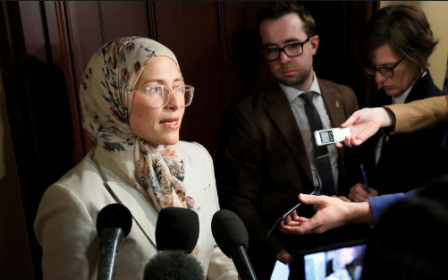Canadian mosque attacker who bear-sprayed congregants sentenced to eight years in prison

The man who attacked congregants at a Canadian mosque using bear spray and wielding an axe in March last year was sentenced to eight years in prison.
"This was a targeted attack on all the congregants of the Islamic Centre, the worshippers present at the time, and on some of the values held dear by Canadians," Sarah Shaikh, a federal prosecutor with the Public Prosecution Service of Canada, said in a statement.
"The sentence reflects the seriousness of the offence and society's condemnation for such attacks."
Trigger Warning: This is the moment the attacker came into Masjid Dar Al-Tawheed hoping to hurt worshippers who had their backs turned to him.
— Ibrahim Hindy (@Hindy500) July 25, 2023
He came with a bag filled with sharp objects, ropes and zip ties. In retrospect, had he swung his hatchet before discharigng the bear… pic.twitter.com/oKQaWpLTAO
The sentencing of Mohammad Moiz Omar took place on Tuesday. Police were investigating the incident as a hate crime, and last week, he pled guilty to three charges including administering a noxious substance with intent to endanger life or cause bodily harm, assault with a weapon, and mischief to religious property with motivation of bias, prejudice or hate based on religion.
Stay informed with MEE's newsletters
Sign up to get the latest alerts, insights and analysis, starting with Turkey Unpacked
On 19 March 2022, Omar entered the Dar al-Tawheed Islamic Centre in Mississauga, Ontario, during the morning prayers and sprayed bear spray towards the congregants while swinging a hatchet. Worshippers took him down and held him until the police arrived at the scene.
According to court documents, he had been planning the attack for a year and was “motivated by hatred of and a desire to intimidate Muslims.”
At Tuesday's sentencing hearing, the results of Omar's independent psychiatric assessment were gone over by the court. According to the assessment, Omar, who was born in Pakistan, had said he considered himself a "non-denominational Muslim" but that he had not been a believer in more than 10 years, CBC reported.
The assessment added that Omar's parents said he started to internalise negative views about Islam when he was an adolescent.
"He became fixated on following media reports and internet stories... bearing that subject matter, and started to fantasise about committing actual harm against seemingly high-value symbolic targets of his religion of origin, culminating in the behaviours in question," the assessment said.
Ibrahim Hindy, the imam of the mosque, stated that the revelations in court last week affirmed the most dreadful fears of his community. He said the attack left the community with long-lasting psychological pain that no jail time would be able to fix.
"This was not someone having a bad day or having a mental health episode. This was someone who planned out clearly what he wanted to do and how he wanted to kill Muslims," Hindy said at a press conference, CBC reported.
"I'm only grateful that our congregation was able to stop him before he was able to ultimately harm someone."
Islamophobia 'entrenched' in Canada
In April, a Canadian Senate committee report found that Islamophobia was "deeply" entrenched in Canadian society and Black hijab-wearing women were the most vulnerable.
Far-right and anti-Muslim hate groups are growing, along with incidents of hate, according to the report by Canada's Standing Senate Committee on Human Rights.
Police-reported hate crimes against Muslim communities across Canada increased by 71 percent in 2021 alone, with around eight incidents per 100,000 Muslims, Statistics Canada reported last year.
In 2021, four members of a Muslim family were killed when a pickup truck ran them over as they were taking an evening walk in London, Ontario.
In 2020, a mosque caretaker was killed in the Toronto area, while three years earlier, a gunman killed six Muslim men at a mosque in Quebec City.
Middle East Eye delivers independent and unrivalled coverage and analysis of the Middle East, North Africa and beyond. To learn more about republishing this content and the associated fees, please fill out this form. More about MEE can be found here.





